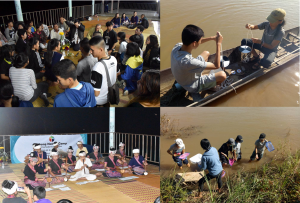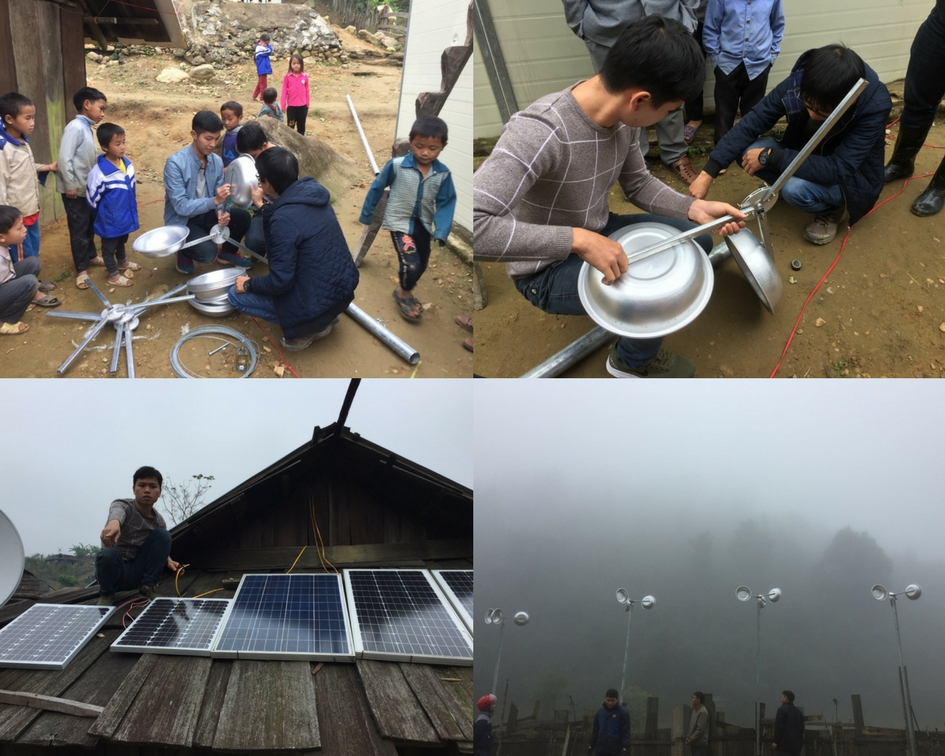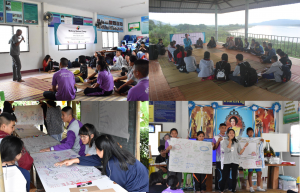ភាពជោគជ័យនៃ “ពានរង្វាន់គ្រាប់ពូជ” នៃកម្មវិធីមេគង្គអាយស៊ីធីខែមលើកទី៥ ឆ្នាំ ២០១៧ (បន្ត)
នៅក្នុងប្លក់មុន យើងរៀបរាប់នៅក្នុងស៊េរីប្លក់ពីលទ្ធផលនៃគម្រោងទាំង៥ ដែលត្រូវបានជ្រើសរើសឱ្យទទួលពានរង្វាន់គ្រាប់ពូជក្នុង កម្មវិធីមេគង្គអាយស៊ីធីខែម ២០១៧។ បន្ទាប់ពីបានណែនាំក្រុមដែលមកពីកម្ពុជា មីយ៉ាន់ម៉ា និងឡាវ នៅក្នុងប្លក់មុនមក ពេលនេះយើងនឹងណែនាំគម្រោងដែលឈ្នះពីប្រទេសថៃ និងវៀតណាម។ គម្រោងទាំងពីរគឺ៖ វិទ្យាស្ថានសិក្សាមេគង្គនៃចំណេះដឹងមូលដ្ឋាន និងគម្រោងទឹកជំនន់ បានទទួលទឹកប្រាក់ចំនួន ៣.០០០ដុល្លារ ពីកម្មវិធី SPIDER ដែលជាកម្មវិធីរបស់ប្រទេសស៊ុយអែតសម្រាប់វិស័យ ICT នៅក្នុងតំបន់កំពុងអភិវឌ្ឍន៍។
ជំរុំធម្មជាតិមេគង្គ៖ ជាបទពិសោធជិតស្និទ្ធជាមួយធម្មជាតិសម្រាប់យុវជន ២០ នាក់
រយៈពេល២ថ្ងៃនៃការរៀនសូត្រពីបទពិសោធន៍ក្នុងបរិបទធម្មជាតិ និងសង្គមនៃទន្លេមេគង្គ ដែលជាប្រភពទន្លេដ៏ធំមួយរបស់ប្រទេសថៃ ដែលជាព្រំប្រទល់ជាមួយប្រទេសឡាវ។ នេះជាអ្វីដែលយុវជន២០នាក់ អាចរីករាយក្នុងអំឡុងពេលបោះជំរុំធម្មជាតិមេគង្គ។ គម្រោងនេះរៀបចំដោយសាលាមេគង្គ ដោយផ្តោតលើចំណេះដឹងដែលមាននៅមូលដ្ឋាន និងការប្រើប្រាស់បច្ចេកវិទ្យាដើម្បីវាយតម្លៃបរិស្ថាននេះ។ សិស្សៗទាំងនោះមានភាពសប្បាយរីករាយនឹងការបោះជំរុំ ដែលកម្មវិធីនេះរួមមានសកម្មភាពដូចជា ការធ្វើដំណើរតាមទូក និងការសន្ទនាជាមួយអ្នកស្រុកដើម្បីរៀនអំពីប្រវត្តិសាស្ត្ររបស់ទន្លេ។ យោងតាមអ្នករៀបចំកម្មវិធី «យុវជនទាំងនោះបានយល់ដឹងអំពីភាពសំបូរបែបនៃទន្លេមេគង្គ ដែលជាជម្រកសត្វ និងបក្សីជាច្រើនដែលយុវជនមិនដែលធ្លាប់ឮពីមុនមក»។ ពិតណាស់បទពិសោធនៃការរៀនសូត្រនេះ មិនត្រឹមតែជាវប្បធម៌នៃការផ្ទេរចំណេះដឹងប៉ុណ្ណោះទេ ប៉ុន្តែថែមទាំងជាកម្មវិធីអនុវត្តជាក់ស្តែង ដែលអាចឱ្យយុវជនស្វែងយល់ពីបរិស្ថានដោយខ្លួនឯង។ បន្ថែមពីនេះ អ្នកចូលរួមបានរៀនពីរបៀបវិភាគ/វាស់ស្ទង់គុណភាពទឹក ទន្លេ និងចូលរួមធ្វើផែនទីសហគមន៍មួយចំនួនទៀតផង។ អ្នករៀបចំការបោះជុំរំសន្និដ្ឋានថា៖ «សិស្សអាចរៀនបានច្រើនតាមរយៈការដាក់ទ្រឹស្ដីទៅជាការអនុវត្តដោយប្រើគម្រោង ដែលមានមូលដ្ឋានលើការរៀនសូត្រនៅខាងក្រៅសាលា។ ប្រសិនបើយើងចង់កសាងចំណេះដឹង និងមានបំណងអភិរក្សទន្លេមេគង្គ និងធនធានធម្មជាតិដទៃទៀត យើងត្រូវផ្តល់ឱកាសដល់យុវជន និងមនុស្សពេញវ័យឱ្យទទួលបានបទផ្ទាល់ដោយផ្ទាល់ ដើម្បីរៀនសូត្រ និងបង្កើតទំនាក់ទំនង កាន់តែជិតស្និទ្ធជាមួយបរិស្ថាន»។ ការបោះជុំរំនេះ ធ្វើឡើងកាលពីខែធ្នូឆ្នាំមុន ដែលនឹងអាចមានសកម្មភាពបែបនេះទៀតនៅក្នុងតំបន់ផ្សេង។ អូឌីស៊ី នឹងបន្តតាមដានគម្រោងដ៏គួរឱ្យចាប់អារម្មណ៍នេះ។

សិស្សៗស្វែងយល់ពីទំនៀមទំលាប់ និងវប្បធម៌របស់អ្នកភូមិ (រូបខាងឆ្វេង) ព្រមទាំងរៀនពីការវិភាគគុណភាពទឹក នៅទន្លេមេគង្គ
អណ្តែតលើទឹកជំនន់៖ គម្រោងផ្តល់ពន្លឺនៅក្នុងសាលារៀន
អន្តរកម្មរវាងធម្មជាតិ និងមនុស្ស ក៏ដើរតួយ៉ាងសំខាន់នៅក្នុងគម្រោងដែលបានរៀបរាប់ខាងលើ ដែលទទួលបាន ពានរង្វាន់គ្រាប់ពូជ។ ក្រុមការងារនៃគម្រោងអណ្តែតលើទឹកជំនន់នៅក្នុងប្រទេសវៀតណាម ដឹងពីបញ្ហាកង្វះខាតនៃការផ្គត់ផ្គង់អគ្គិសនីនៅតាមជនបទ ហើយក៏មិនស្ទាក់ស្ទើរក្នុងការចាត់វិធានការដែរ។ សាលាបឋមសិក្សាចំនួន២ ដែលរហូតមកទល់ពេលនេះ មិនមានចរន្តអគ្គិសនី គឺជាអ្នកទទួលផលពីគម្រោងនេះ។ អរគុណដល់ទួរប៊ីនខ្យល់ ចំនួន១០ ដែលបានដំឡើង ដោយក្រុមគ្រូៗ និងសិស្សានុសិស្ស ដែលឥឡូវនេះមានភ្លើងបំភ្លឺ ហើយអាចប្រើឧបករណ៍អេឡិចត្រូនិកសាមញ្ញៗដូចជាវិទ្យុ ឬទូរទស្សន៍។ ក្រុមការងារគម្រោងនេះបានពន្យល់ថា “ការទទួលបានអគ្គិសនីប្រើប្រាស់នេះ បានលើកទឹកចិត្តឱ្យសិស្សានុសិស្សសិក្សា គ្រូបង្រៀន និងកាត់បន្ថយហានិភ័យ ក្នុងអំឡុងពេលរដូវធ្លាក់អ័ព្ទ និងខ្យល់ព្យុះ”។ ទោះជាយ៉ាងណាក៏ដោយ ការដំឡើងទួរប៊ីនខ្យល់នេះ គ្រាន់តែធាតុសំខាន់មួយនៃគម្រោងនេះប៉ុណ្ណោះ។ សម្រាប់អ្នករៀបចំគម្រោងនេះ វាមានសារៈសំខាន់ណាស់ក្នុងការចូលរួម និងជួយដល់ប្រជាជនក្នុងតំបន់។ ហេតុនេះហើយ ពួកគេបានផ្សព្វផ្សាយបេសកកម្មរបស់ពួកគេតាមរយៈប្រព័ន្ធផ្សព្វផ្សាយក្នុងស្រុក៖ “ដំបូង វាស្ទើរតែមិនអាចទាក់ទងជាមួយសហគមន៍បានទេ។ ក្រុមការងាររបស់គម្រោងបានផ្ញើរអ៊ីម៉ែលទៅអ្នកកាសែតក្នុងស្រុក ដោយមិនស្គាល់គាត់ពីមុនមកនោះទេ។ អ្វីដែលគួរឱ្យភ្ញាក់ផ្អើលនោះគឺ ក្រុមនេះបានទទួលការគាំទ្រយ៉ាងខ្លាំងពីអ្នកកាសែតនោះ ហើយគាត់បានក្លាយជាឯកអគ្គរដ្ឋទូតតំណាងក្នុងសហគមន៍ទៀតផង”។ សមាជិកក្រុមការងារ សង្ឃឹមថាគម្រោងនេះ អាចជាគម្រោងផ្តល់ពន្លឺមួយ ដែលទាក់ទាញម្ចាស់ជំនួយបន្ថែមទៀត ដើម្បីគាំទ្រដល់សកម្មភាពស្រដៀងគ្នានេះ។

ទីតាំងសាលារៀនដែលក្រុមការងារគម្រាងចុះទៅ។

ក្រុមការងារគម្រោងកំពុងតំឡើងទួរប៊ីនខ្យល់។
អូឌីស៊ី មានក្តីសោមនស្សរីករាយនឹងលទ្ធផលនៃជ័យលាភីទាំង៥។ ក្រុមទាំងនោះបានបង្ហាញថា គំនិតដ៏ល្អមួយដែលអាចមានឥទ្ធិពលយ៉ាងខ្លាំងលើជីវិតរស់នៅរបស់ប្រជាជននៅប្រទេសទាំង៥។ គ្រប់ក្រុមទាំងអស់បានរាយការណ៍ពីបញ្ហា និងឧបសគ្គដែលពួកគេត្រូវដោះស្រាយ និងដែលពួកគេភាគច្រើននៅទីបំផុតអាចសម្រេចបាន។ បទពិសោធន៏ដែលផ្តល់ពានរង្វាន់ជំនួយគ្រាប់ពូជនេះ មិនត្រឹមតែមានផលវិជ្ជមានសម្រាប់សហគមន៍ ដែលរងផលប៉ះពាល់ និងក្រុមគោលដៅនោះទេ ប៉ុន្តែក៏បានពង្រឹងរចនាសម្ព័ន្ធក្រុមរបស់ក្រុមរៀបចំផងដែរ។ ដូច្នេះ អូឌីស៊ី មានសុទិដ្ឋិនិយមថា គម្រោងទាំងនេះអាចជាចំណុចចាប់ផ្ដើមសម្រាប់ការចូលរួមជាបន្តបន្ទាប់របស់ក្រុមទាំង៥ ហើយជាឧទាហរណ៍ដ៏អស្ចារ្យសម្រាប់អ្នកចូលរួមក្នុងជំរុំ កម្មវិធីមេគង្គអាយស៊ីធីខែម នាពេលអនាគត។


